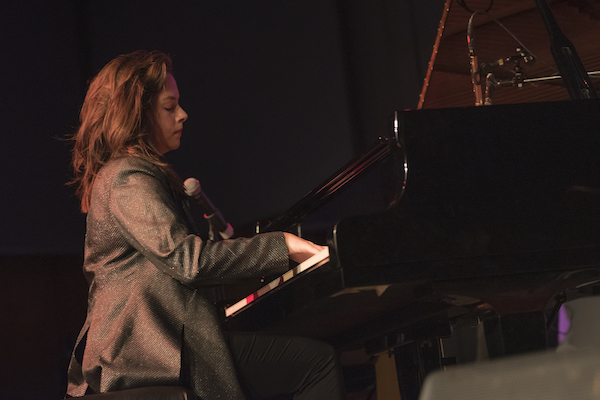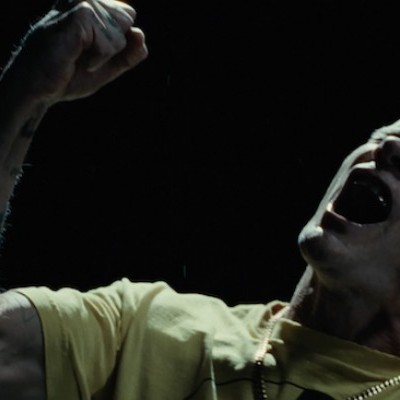Dec 9, 2025 12:28 PM
In Memoriam: Gordon Goodwin, 1954–2025
Gordon Goodwin, an award-winning saxophonist, pianist, bandleader, composer and arranger, died Dec. 8 in Los Angeles.…

Kasia Pietrzko performs during the Jazz Forum Showcase in Szczecin, Poland, which ran Oct. 1–3.
(Photo: Kasia Stanczyk)The inaugural edition of Jazz Forum Showcase Powered by Szczecin Jazz, which ran from Oct. 1–3 in Szczecin, a bustling city of 400,000 on the Oder River in northwest Poland, gestated about three years ago. That’s when Asia Pieczykolan, the managing editor of Poland’s Jazz Forum magazine, began strategizing ways to guide Poland’s creatively fertile pool of young jazz musicians through the complexities of the music business.
“I work with them every day, and I know the problems they face,” Pieczykolan said. “I thought it would be great to create an event like jazzahead! in Bremen, and I started looking for a partner.” She contacted Sylwester Ostrowski, a 43-year-old saxophonist—and Szczecin native—who has produced the Szczecin Jazz Festival since 2016. “They are fantastic musicians,” Pieczykolan continued. “But they don’t know the reality of how the music industry works. Sylvester is a great musician and a great businessman in one person, with contacts all over the world.”
On Oct. 3, Ostrowski’s Culture Revolution project, which he co-leads with trumpeter Keyon Harrold—featuring keyboardist Shedrick Mitchell, bassist Burniss Earl Travis II, drummer Justin Tyson and vocalist Jermaine Holmes—delivered a rousing collaboration with vocalist Lizz Wright. This was preceded by a poetic opening set by Polish pianist Marcin Wasilewski and his trio. At the end, a 60-voice Szczecin-based choir assumed the stage for heavenly signification on the finale, “Light Within,” by tenor saxophonist Billy Harper (Harrold’s late-’90s mentor at The New School and someone whom Ostrowski described as “my musical father from an artistic point of view”).
“Billy took Keyon to a competition that I sponsored in Poland 20 years ago, and Keyon won it,” Ostrowski recalled. “We liked each other and stayed in contact. Keyon’s generation of musicians play bebop and hip-hop the same way, and do business and art the same easy way. I’ve learned a lot from them about how art and business should go together. We in Poland should do the same.”
That aspiration was explored in a series of intelligently organized late-morning and early-afternoon panels, on subjects like “Challenges Facing Jazz Musicians in the 21st Century,” “The Audience, Meaning Who?” and “Ready for Export,” as well as presentations with tips on interacting with journalists, bookers and promoters.
These transpired after 10 a.m. sessions in which members from each of the eight showcase bands endeavored to encapsulate their essence in five minutes before taking questions. Later, at 6 p.m. sharp, at the headquarters of Radio Szczecin, came the concerts, four bands a night over the first two nights, streamed live on Worldwide FM.
Each band displayed high musicianship, and each played original music. Ostrowski described their common threads: “Our musicians have a Polish feeling, a kind of energizing tension that’s combined with this romantic melancholy that is super-specific for the Polish mood, close to blues in the U.S. We lived through Communism and other difficult things, and we’ve tried to become a free nation. So from a social point of view, we all have the blues.”
A standout artist was pianist Kamil Piotrowicz, whose excellent sextet included baritone saxophonist Piotr Checki, alto saxophonist Kuba Więcek, and trumpeter Emil Miszk in the front line, along with bassist Andrzej Święs and drummer Krzysztof Szmanda. The band offered episodic, highly detailed compositions, some tonal, some not, that refracted into the leader’s own argot a variety of well-considered influences, among them the Polish film composer (and jazz pianist) Krzysztof Komeda, Tim Berne, Anthony Braxton, David Binney and Steve Reich.
Kasia Pietrzko’s trio, with Święs on bass and Piotr Budniak on drums, followed
Piotrowicz on the first night, interpreting the 25-year-old pianist’s harmonically sophisticated stories, which spurred melodic improvisations that channeled the Romantic spirit and virtuosic chops associated with Polish piano expression for several centuries.
On the second night, bassist Damian Kostka and drummer Adam Zagorski propelled kinetic sets by ZK Collaboration and Weezdob Collective. Weezdob’s strong front line blended the phantasmagoric sound of chromatic harmonicist Kacper Smoliński with tenor saxophonist Kuba Marciniak and guitarist Piotr Scholz. ZK’s self-described “old school-new school” synthesis postulated post-bop vocabulary, rendered idiomatically, without cliches, by pianist Mateusz Gawęda and alto saxophonist Maciej Kadziela. The grooves were avant-funk, executed by Kostka with precise articulation and huge tone, in synch with Zagorski’s crisp, dialoguing beat combinations.
“I think our scene needs this showcase,” said Kadziela, 29, a storytelling soloist whose capacious, astringent tone channels the spirit of Jackie McLean. “ZK Collaboration has played more or less everywhere in Poland the last few years, and we’re running out of places. The idea is to show the world, ‘Yeah, we’re here; come on, check us out.’” DB
Correction: In an earlier version of this story, pianist Kamil Piotrowicz and saxophonist Sylwester Ostrowski were misidentified. DownBeat regrets the errors.

Goodwin was one of the most acclaimed, successful and influential jazz musicians of his generation.
Dec 9, 2025 12:28 PM
Gordon Goodwin, an award-winning saxophonist, pianist, bandleader, composer and arranger, died Dec. 8 in Los Angeles.…

Belá Fleck during an interview with Fredrika Whitfield on CNN.
Jan 13, 2026 2:09 PM
The fallout from the renaming of the John F. Kennedy Center for the Performing Arts to include President Donald…

The success of Oregon’s first album, 1971’s Music Of Another Present Era, allowed Towner to establish a solo career.
Jan 19, 2026 5:02 PM
Ralph Towner, a guitarist and composer who blended multiple genres, including jazz — and throughout them all remained…

Flea has returned to his first instrument — the trumpet — and assembled a dream band of jazz musicians to record a new album.
Dec 2, 2025 2:01 AM
After a nearly five-decade career as one of his generation’s defining rock bassists, Flea has returned to his first…

Rico’s Anti-Microbial Instrument Swab
Jan 19, 2026 2:48 PM
With this year’s NAMM Show right around the corner, we can look forward to plenty of new and innovative instruments…